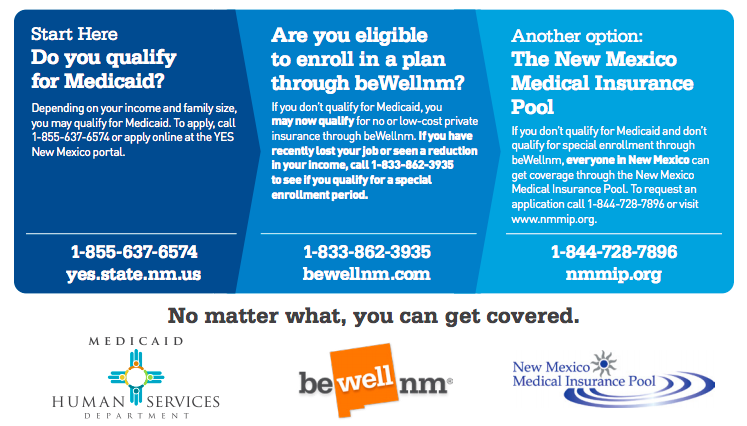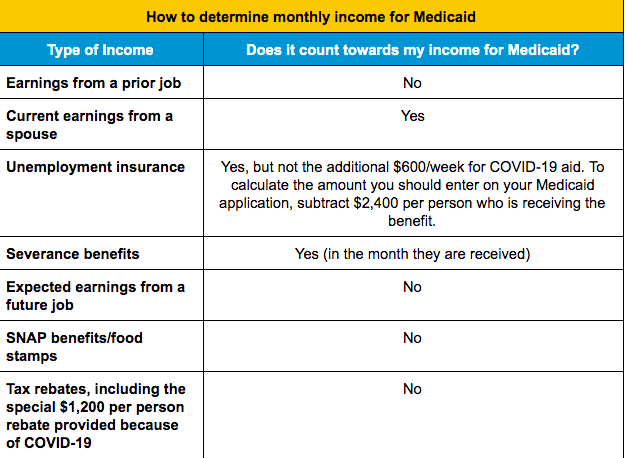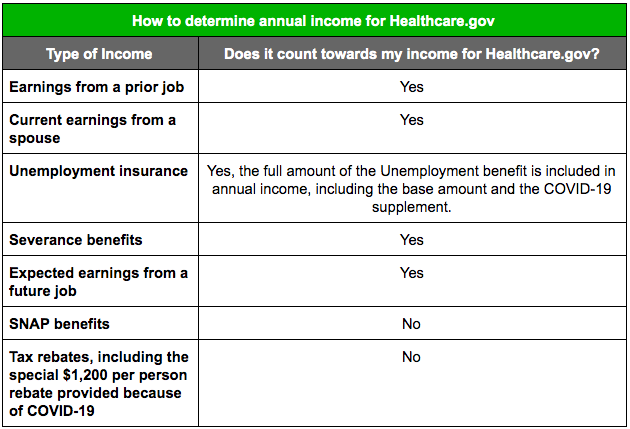Know Your Health Coverage Options!
Every New Mexican resident qualifies for some form of health coverage, and it is crucial for everyone to maintain quality coverage. The aftermath of the pandemic has left many without coverage and unsure of their options.
First, if your employer offers you affordable health insurance, you are not eligible for most other health coverage programs. However, if your employer does not offer coverage or it is too expensive, start by exploring your options below.
The first thing you should do is use Healthcare.gov’s online screening tool to see what type of coverage you might qualify for. Based on that screening, we recommend contacting the New Mexico Human Services Department, BeWellnm, or the NM Medical Insurance Pool to get help filling out your application. But if you want to sign up on your own, this blog post has some helpful tips.

Medicaid
Medicaid is a comprehensive health coverage program that is available to low-income U.S. citizens. If you receive coverage through Medicaid, all costs related to COVID-19 will be covered free of charge. If you were billed for testing or treatment related to COVID-19, you can file a complaint here. Medicaid eligibility is based on your household’s current monthly income, not how much you made in the past or expect to make this year. You qualify for Medicaid if you make less than the monthly income listed on the table below called “TABLE 1: Medicaid Eligibility.” When selecting your family size, include yourself, your spouse, and everyone you claim as a dependent, even if they don’t need coverage. If you have questions about whether or not to include someone when determining your family size, check here.
To see if you qualify for Medicaid, select how many people are in your family at the far left of the table, then see if your monthly income is below the amount listed. If it is, you likely qualify for Medicaid. Even if you don’t qualify for Medicaid, your children might.
If you think you qualify for Medicaid, visit www.yes.state.nm.us 1-855-637-6574 to confirm that you meet the basic program requirements.
Sign up over the phone: If you want help with your application call or prefer to complete your application over the phone, call 1-855-637-6574.
Sign up online:Online Application
Fill out the application on paper:Paper Application
Need help? Call customer service at 1-800-283-4465 or visit this webpage.
During the application process, you will be asked to provide information about your household income. The table below shows the type of income information that you will need to share to get covered.

Source: Brookings Institute
Marketplace Coverage through BeWellNM
Marketplace Coverage is available to individuals and families that do not qualify for Medicaid and are not offered insurance by an employer. Many Marketplace applicants qualify for premium reductions based on income and household size. These reductions are called Premium Tax Credits, and are based on your expected incomefor the year you are applying for coverage. For instance, if you were enrolling for coverage for 2024, you would calculate what you think your income will be for 2024, and the Marketplace will use that amount and your household size to calculate the discounts you qualify for. For questions about how to estimate your income and who to include in your household, click here.
If you lose your job-based health insurance, have a significant reduction in your income, or experience other qualifying events, you may be eligible for a special enrollment period to sign up for coverage. If you experience one of these events, you have a 60-day window to apply for coverage.
Remember, if your income goes up during the year, you should adjust it on bewellnm.com so that you don’t have to pay it back at the end of the year. You can also adjust your income down if you expect to earn less, which will reduce your premiums. If you gain a new form of coverage, such as Medicaid or job-based coverage, make sure to terminate your coverage through BeWellNM to avoid unexpected fees.

If you think you qualify for Marketplace Coverage through BeWellNM, you can apply, compare plans, and find resources at bewellnm.com or call 1-833-862-3935.
The New Mexico Medical Insurance Pool
All people who reside in New Mexico qualify for the New Mexico Medical Insurance Pool (or “the pool”) if they are ineligible for other coverage . You can sign up for the pool any time of the year. You can get premium discounts based on your income.
Normally, the pool uses your tax return from the previous year as well as any Social Security payments you receive to determine eligibility. However, if you lose your job or have other major changes in your economic situation, you can give them an estimate of your current income and the pool will work with you to reduce your premiums.
If you think you qualify for the New Mexico Medical Insurance Pool, visit nmmip.org or call 1-505-424-7105 or 1-844-728-7896.
Fill out a digital or paper application:Digital or Print Application
Keep your employer coverage
COBRA allows you to continue the health coverage you had through your employer after you lose a job, as long as the termination did not involve gross misconduct. This option is available to workers whose employer covers 20 or more employees. COBRA is usually quite expensive and other coverage options, like Medicaid, Marketplace Coverage through BeWellNM, and the NM Medical Insurance Pool, are typically more affordable. Click here to see if you qualify for COBRA. For application assistance, call 1-866-444-3272. If you need more information, you can visit the following websites:
New Mexico COBRA Insurance - Health Care Continuation
U.S. Department of Labor: Continuation of Health Coverage (COBRA)
How can I get help with my application?
If you want to talk to an enrollment counselor who is not affiliated with any health insurance company, visit https://bewellnm.com/Find-Counselor. They can usually help you sign up for any type of insurance, including Medicaid, Marketplace Coverage through BeWellNM, the NM Medical Insurance Pool, or Medicare.
If you want to talk to a broker about signing up for private insurance or insurance through the NM Medical Insurance Pool, visit https://bewellnm.com/Find-Broker to find a broker in your area.
Medicaid
Human Service Department’s Customer Assistance Center: 1-800-283-4465
Marketplace Coverage through BeWellNM
BeWellNM’s Call Center: 1-833-862-3935
NM Medical Insurance Pool
Office Number: 1-505-424-7105
Call Center: 1-844-728-7896
How do I avoid scams?
Unfortunately, some are using this pandemic as an opportunity to sell junk health insurance by misleading people about their options. Here are some websites you can trust to give you accurate information about comprehensive health coverage:
Hsd.state.nm.us or yes.state.nm.us
Health Action



